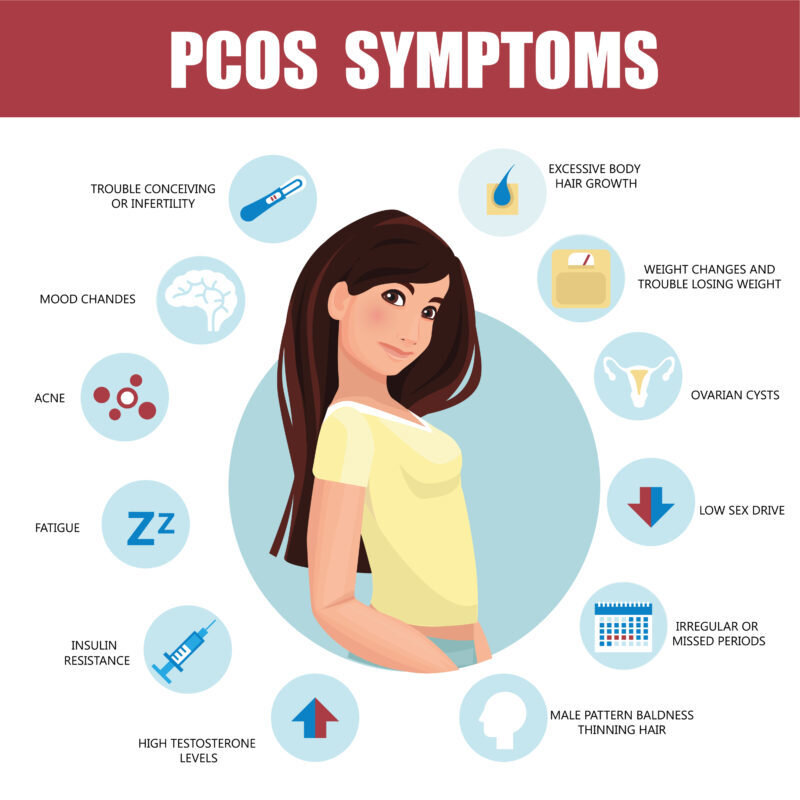
Polycystic Ovary Syndrome (PCOS) is a common hormonal disorder affecting many women of reproductive age. One of the significant challenges associated with PCOS is its impact on fertility. Understanding how PCOS affects fertility and implementing effective management strategies can help women increase their chances of conception. In this blog, we will explore the connection between PCOS and infertility, as well as practical tips for managing the condition to enhance fertility.
Understanding PCOS and Its Impact on Fertility
PCOS is characterized by hormonal imbalances, irregular menstrual cycles, and the presence of cysts on the ovaries. These hormonal imbalances can lead to:
- Irregular Ovulation: Many women with PCOS experience irregular or absent ovulation, making it difficult to conceive.
- Insulin Resistance: PCOS often results in insulin resistance, which can lead to weight gain and increase the risk of developing type 2 diabetes. Insulin resistance can also affect hormone levels, further complicating fertility.
- Hormonal Imbalances: Elevated levels of androgens (male hormones) in women with PCOS can disrupt the normal functioning of the ovaries and interfere with the menstrual cycle.
Tips for Managing PCOS to Boost Fertility
While PCOS can pose challenges to fertility, there are several effective management strategies that women can adopt to improve their chances of conception:
1. Maintain a Healthy Weight
Why It Matters:
Weight management is crucial for women with PCOS. Even a modest weight loss of 5-10% can significantly improve insulin sensitivity and hormonal balance, leading to more regular ovulation.
How to Achieve It:
Focus on a balanced diet rich in whole foods, including fruits, vegetables, lean proteins, and healthy fats. Regular physical activity, such as aerobic exercises and strength training, can also aid in weight management.
2. Follow a PCOS-Friendly Diet
What to Include:
Adopt a diet low in refined carbohydrates and high in fiber. Foods that are beneficial include:
- Whole grains (quinoa, brown rice)
- Fresh fruits and vegetables
- Lean proteins (chicken, fish, legumes)
- Healthy fats (avocado, nuts, olive oil)
What to Avoid:
Limit processed foods, sugary snacks, and high-carb meals, as they can exacerbate insulin resistance.
3. Manage Insulin Levels
Why It Matters:
Addressing insulin resistance can help regulate menstrual cycles and promote ovulation.
Strategies:
Consider consulting a healthcare provider about medications such as Metformin, which can improve insulin sensitivity and support weight loss. Additionally, incorporating regular physical activity can enhance insulin sensitivity.
4. Monitor Your Menstrual Cycle
Importance of Tracking:
Understanding your menstrual cycle can help identify ovulation patterns, aiding in family planning.
Tools:
Use ovulation predictor kits, smartphone apps, or fertility monitors to track ovulation and menstrual cycles accurately.
5. Consult a Fertility Specialist
If you’re struggling to conceive despite lifestyle changes, seeking professional help is essential. A fertility specialist can evaluate your specific situation and recommend treatments such as:
- Ovulation induction with medications
- Assisted reproductive technologies (IVF or IUI)
6. Consider Supplements
Some supplements may help manage PCOS symptoms and support fertility, such as:
- Inositol: This supplement may help improve insulin sensitivity and promote ovulation.
- Vitamin D: Low levels of vitamin D are common in women with PCOS; supplementation can help improve reproductive function.
- Omega-3 Fatty Acids: These can help reduce inflammation and improve metabolic profiles.
Conclusion
While PCOS can pose challenges to fertility, understanding its impact and adopting effective management strategies can significantly enhance your chances of conception. By maintaining a healthy weight, following a balanced diet, managing insulin levels, and consulting healthcare professionals, women with PCOS can take proactive steps toward improving their fertility. Remember, each journey is unique, so it’s essential to find the right approach that works for you. With the right support and lifestyle changes, many women with PCOS can successfully conceive and enjoy a healthy pregnancy.

